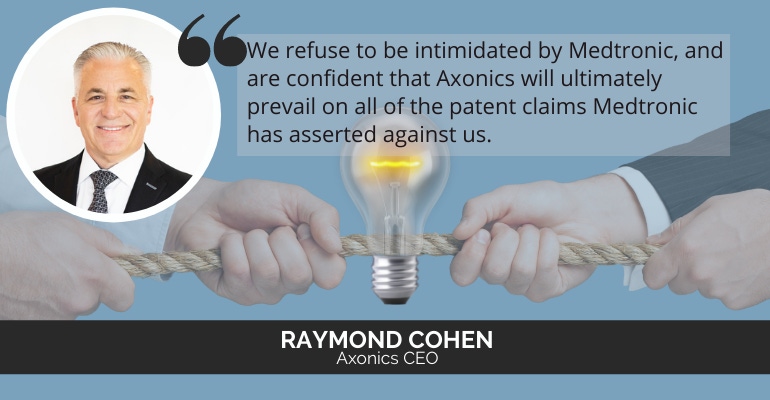Axonics CEO: We Refuse to Be Intimidated by Medtronic
The ongoing war between Medtronic and Axonics is far from over, but the patent board has delivered its final decision.
September 24, 2021

The Patent Trial and Appeal Board (PTAB) of the U.S. Patent and Trademark Office has officially upheld most claims in the Medtronic patents that Axonics challenged, but this intellectual property feud is far from over.
With regard to Medtronic's InterStim technology, the PTAB affirmed all claims in U.S. Patent Nos. 8,457,758 ('758) and 8,738,148 ('148); and affirmed claims 1-7, 16-18 and 22 of Medtronic's U.S. Patent No. 9,821,112 ('112), while invalidating claims 9-13 and 20. These patents relate to recharging technology. Medtronic said it is weighing its legal options with regard to the invalidated patent claims in the '112 patent. The '758 patent and the '148 patent expire in April 2025, the '112 patent expires in April 2024.
This decision comes about a week after the PTAB upheld all the claims in U.S. Patent Nos. 8,036,756 and 8,626,314, which protects technology related to its tined leads; and upheld claim 7 in Medtronic's U.S. Patent No. 7,774,069 ('069 patent), which protects technology related to its recharge power control. The PTAB's decision on the '069 patent also found claims 5, 6, 8 and 9 invalid, while claims 1-4 and 10-13 were not challenged by Axonics.
Axonics plans to appeal the PTAB’s decisions on the claims it declined to invalidate to the Director of the Patent & Trademark Office and to the U.S. Court of Appeals for the Federal Circuit. The PTAB’s decision only relates to the issue of invalidity or patentability of the Medtronic patents and does not mean that Axonics infringes any of the patents.
Medtronic said it plans to ask the U.S. District Court in the Central District of California to lift the stay on the IP infringement case and resume proceedings. Axonics, however, said it expects the stay on legal proceedings to continue until the appeals process is complete.
"Medtronic appreciates the Patent Trial and Appeal Board's efforts in this matter," said Brett Wall, executive vice president and president of the neuroscience portfolio at Medtronic. "We are pleased with the outcome of the review process and look forward to our day in court to protect the proprietary technology that brings SNM therapy to patients around the world."
Last week, after the PTAB issued its decision regarding three of the six patents it reviewed in the case, the company referred to the upheld claims as a victory, which Axonics CEO Raymond Cohen took issue with.
“First and foremost, it is important to understand that the PTAB rulings as to whether the claims in the Medtronic patents are valid or not do not mean that anyone has ‘won’ anything. When one party suggests that another party is infringing, the other party often asks the PTAB to determine if the claims in the patents are actually valid. This is what Axonics has done, and for Medtronic to claim ‘victory’ is purely posturing," Cohen said.
The Axonics CEO also said he considers it a net positive for his company that the PTAB decided to invlaidate several claims in Medtronic's '112 patent is a net positive for Axonics.
"Moreover, we believe the PTAB’s narrow construction of the claims in the ‘758 patent and ‘148 patent strengthens our non-infringement argument. Axonics remains confident that it does not infringe any Medtronic patents – valid or invalid – and that we will ultimately prevail on the patent claims asserted against us," Cohen said.
Cohen also reiterated his belief that Medtronic's claims are designed to stifle competition, limit patient and physician choice, and protect Medtronic's monopoly in sacral neuromodulation (SNM).
"Medtronic took advantage of its monopoly and chose not to innovate for over 20 years. Axonics took a different path and, in effect, created a renaissance in SNM therapy by introducing significant enhancements such as a long-lived rechargeable implantable neurostimulator and making SNM devices MRI compatible for the first time. We refuse to be intimidated by Medtronic and are confident that Axonics will ultimately prevail on all of the patent claims Medtronic has asserted against us. In the meantime, we remain focused on fulfilling our mission of changing the lives of patients suffering from bladder and bowel dysfunction.”
What you need to know about the ongoing feud between Medtronic and Axonics
If you haven't already been following this IP battle, here are the key points you need to know:
Medtronic pioneered the SNM market over 20 years ago with its InterStim device, used to treat various bladder and bowel conditions.
Along came Axonics Modulation Technologies with FDA approval in 2019 for a rechargeable version of a similar device.
The market incumbent almost immediately filed a lawsuit against Axonics, alleging infringement on certain claims in seven patents related to Medtronic's SNM lead placement procedure and implant recharging technologies.
Axonics filed seven petitions with the USPTO requesting an inter partes review of each of the Medtronic patents in question.
Medtronic catches up with the market challenger by winning FDA approval of its own rechargeable SNM device.
In September 2020, the PTAB decided to review the validity of six of the seven Medtronic patents in question. However, the PTAB decided not to institute a review of one of the patents — (U.S. Patent No. 9,463,324 ('324 patent) — because there is not a reasonable likelihood that any of the claims in that particular patent would be found to be invalid. According to Medtronic, the '324 patent protects key technology related to implant recharging and temperature control and is central to the infringement case pending against Axonics.
Last week, the PTAB upheld three of the patents Axonics challenged.
About the Author(s)
You May Also Like



.png?width=300&auto=webp&quality=80&disable=upscale)
